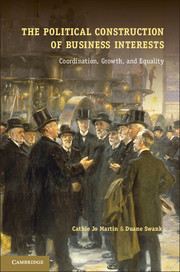Book contents
- Frontmatter
- Contents
- Figures
- Tables
- Acknowledgments
- Introduction
- 1 Collective Political Engagement and the Welfare State
- 2 The Political Origins of Coordinated Capitalism
- 3 Party Conflict and the Origins of Danish Labor Market Coordination
- 4 British Experiments in National Employers’ Organization
- 5 Sectional Parties and Divided Business in the United States
- 6 The Origins of Sector Coordination in Germany
- 7 Twenty-First Century Breakdown? Challenges to Coordination in the Postindustrial Age
- 8 Institutional Sources of Employers’ Preferences for Social Policy
- 9 Employers, Coordination, and Active Labor Market Policy in Postindustrial Denmark
- 10 Employers and Active Labor Market Policy in Postindustrial Britain
- 11 The Failure of Coordination and the Rise of Dualism in Germany
- 12 The Political Foundations of Redistribution and Equality
- Conclusion Social Solidarity after the Crisis of Finance Capitalism
- Bibliography
- Index
11 - The Failure of Coordination and the Rise of Dualism in Germany
Published online by Cambridge University Press: 05 June 2012
- Frontmatter
- Contents
- Figures
- Tables
- Acknowledgments
- Introduction
- 1 Collective Political Engagement and the Welfare State
- 2 The Political Origins of Coordinated Capitalism
- 3 Party Conflict and the Origins of Danish Labor Market Coordination
- 4 British Experiments in National Employers’ Organization
- 5 Sectional Parties and Divided Business in the United States
- 6 The Origins of Sector Coordination in Germany
- 7 Twenty-First Century Breakdown? Challenges to Coordination in the Postindustrial Age
- 8 Institutional Sources of Employers’ Preferences for Social Policy
- 9 Employers, Coordination, and Active Labor Market Policy in Postindustrial Denmark
- 10 Employers and Active Labor Market Policy in Postindustrial Britain
- 11 The Failure of Coordination and the Rise of Dualism in Germany
- 12 The Political Foundations of Redistribution and Equality
- Conclusion Social Solidarity after the Crisis of Finance Capitalism
- Bibliography
- Index
Summary
Introduction
Modell Deutschland was a great success during the golden age of postwar reconstruction and economic expansion and continued to inspire admiration even in the aftermath of the OPEC oil shocks and attendant global recessions and inflation. In the immediate postwar decades, German growth rates were at, or above, average, unemployment and inflation rates remained below average, and economic inequality was modest to low. During the post-OPEC 1970s and 1980s, Germany continued to exhibit respectable export-led economic growth, relatively low inflation, and modest fiscal imbalances.
After the oil crisis, however, unemployment appeared as a growing blight on Germany, and since the 1980s, poor employment performance has been exacerbated by rising labor market dualism and economic inequality. A series of economic shocks – together with international market competition and technological change – have racheted-up long-term levels of unemployment, engendered structural adjustments, and exacerbated labor market inequities. These shocks and structural changes have eroded the already limited capacities among the German state and employers’ associations to achieve national, cooperative, and egalitarian responses to significant postindustrial challenges. The fragmented structure of the German state, coupled with its relatively weak fiscal and employment position within the political economy, has resulted in state failure to promote concertation among the social partners. Employers’ associations increasingly fall short in their capacity to foster the internalization by employers of the external economic costs of employers’ strategic choices and to promote a long-term perspective of employers’ collective interests.
- Type
- Chapter
- Information
- The Political Construction of Business InterestsCoordination, Growth, and Equality, pp. 208 - 226Publisher: Cambridge University PressPrint publication year: 2012

